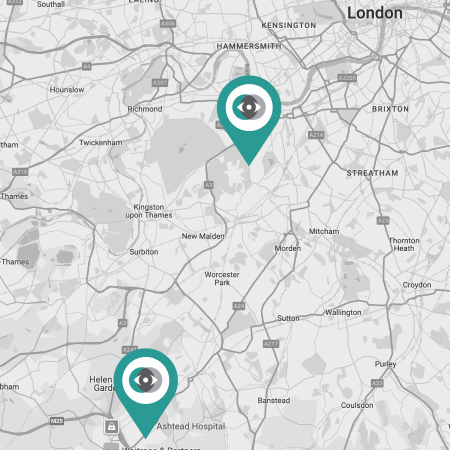
How Long Between Cataract Surgery on Each Eye?
Cataract surgery is one of the most commonly performed and successful surgical procedures worldwide. It involves the removal of the eye's cloudy lens and replacing it with a clear artificial lens to restore vision. Many patients who undergo cataract surgery often require treatment for both eyes, but a common question arises: how long should you wait between surgeries on each eye? This blog will explore the recommended timing, factors to consider, and what to expect during your recovery.
The Recommended Timing
Typically, cataract surgery is performed on one eye at a time. Professor Ursell usually recommends waiting two weeks between the procedures for each eye. This interval allows the first eye to heal adequately and ensures your surgeon can assess its progress before proceeding with the second eye. However, the exact timing may vary based on individual circumstances, such as your overall health, the complexity of your surgery, and your vision needs.
In some cases, surgeries may be performed closer together, such as within one week, especially if the patient’s daily activities are significantly impaired or you are coming to see Professor Ursell from abroad. Conversely, some patients may choose or need to wait longer due to specific medical or logistical reasons.
Why Not Perform Both Surgeries on the Same Day?
Simultaneous bilateral cataract surgery—operating on both eyes on the same day—is possible and practised in some settings, it is recommended in some situations. This has been extensively debated within the worldwide surgical community since the pandemic & Prof Ursell has been a leader in this discussion. Prof Ursell finds that about 50% of patients prefer to have both surgeries on the same day and 50% prefer to have it 2 weeks apart.
Factors That Influence Timing
Several factors can influence the interval between cataract surgeries, including:
- Visual Imbalance: After surgery on the first eye, patients may experience a significant visual difference between the operated eye and the untreated eye. This can cause discomfort, particularly for those who rely on glasses or have a strong prescription. If this imbalance significantly affects daily activities, Prof Ursell may recommend two operations on the same day..
- Overall Health: If you have underlying medical conditions such as diabetes, hypertension, or autoimmune diseases, Prof Ursell may recommend both operations on the same day..
- Urgency of Vision Restoration: Patients with jobs or responsibilities that require optimal vision might prefer a shorter interval to regain full binocular vision more quickly.
- Convenience: Having both operations on the same day can be more convenient for some.
- Recovery: Some of our patients prefer to have one eye operated first and allow the vision to recover before proceeding with surgery on the other eye 2 weeks later
What to Expect Between Surgeries
After the first cataract surgery, it’s crucial to follow your surgeon’s post-operative care instructions to ensure proper healing and minimise complications. Here’s what you can expect:
- Improved Vision: Many patients notice an immediate improvement in vision within the first few days after surgery, though full recovery may take a few weeks.
- Temporary Visual Imbalance: As mentioned earlier, the difference in vision between the operated and untreated eye can feel disorienting. Temporary solutions, such as wearing glasses with one lens removed or using a contact lens in the untreated eye, may help during this period.
- Follow-Up Appointments: Regular check-ups with your surgeon are essential to monitor healing and address any issues. These appointments also help determine the readiness for the second surgery.
Benefits of Staggered Surgeries
Staggering the surgeries for each eye offers several benefits:
- Optimised Outcomes: By evaluating the success of the first surgery, your surgeon can make adjustments for the second eye if needed.
- Patient Confidence: Experiencing the results of the first surgery often reassures patients about proceeding with the second eye.
When to Contact Prof Ursell
If you experience any of the following issues after your surgery, it is vital to contact your surgeon promptly before proceeding with the second eye:
- Severe pain or discomfort
- Sudden vision loss or significant changes in vision
- Persistent redness or swelling
- Signs of infection, such as discharge or fever
Your surgeon will address these concerns and determine the appropriate timing for your second procedure.
Ready to Restore Your Vision?
Cataract surgery is a life-changing procedure that can significantly improve your quality of life. Whether you’re planning for your first surgery or preparing for the second, understanding the ideal timing and what to expect is key to a smooth recovery and optimal results.
If you have questions about cataract surgery or would like to schedule an appointment, our experienced team at Cataract Doctor is here to help.
Book an appointment today to take the first step toward clearer vision!
Are you suitable for vision correction surgery?
It isn’t suitable for everyone.
The first step is to book an assessment so you can find out whether you can benefit.
Our most popular procedures
What our patients say…
★ ★ ★ ★ ★“Excellent result. Complete confidence in Paul Ursell. Quiet, quick, and efficient. Peaceful and comfortable hospital.”
★ ★ ★ ★ ★
“The cataract surgery on both of my eyes went very smoothly without any problems. There was no pain afterwards and I didn’t have to wear any eyepatch. I would highly recommend Professor Ursell for cataract surgery.”
★ ★ ★ ★ ★“Highly professional, extremely efficient, and an excellent communicator, Paul exudes experience, knowledge, and ability. The whole process — initial consultation, operation, and post-op check-up — was wonderfully stress-free. I now have 20/20 vision, am glasses-free, and I am delighted by the results.”
★ ★ ★ ★ ★
“The cataract surgery has completely changed my life. Mr. Ursell put me at ease and explained all options. The procedure was quick and painless and completely successful, and I now have 20/20 vision in my good eye. One of the reasons I had the surgery was because of Mr. Ursell’s standing and experience. Cannot praise highly enough.”
★ ★ ★ ★ ★
“I was very short-sighted and my cataracts badly affected both reading and distance acuity. After the operation I now have very good distance vision (glasses-free) but still need glasses for reading. (This was the expected outcome as I did not want multi-focus implants). The operation was quick and painless, and I had no post-operative discomfort at all (which surprised me). The results are remarkable.
I can certainly recommend Professor Ursell. He is a personable consultant and a skilled surgeon.”
★ ★ ★ ★ ★
“Dr. Paul Ursell squashed many of my concerns for not having cataract surgery. He offered comfort with examples of his long/distinguished career and new technology that he applies to the surgery.
Both before and after the surgery, Dr. Ursell and staff gave me the information and attention I needed. It was a great success, and I highly recommend Dr. Ursell.”
We have replaced the images of real patients who provided these testimonials to protect their privacy.








